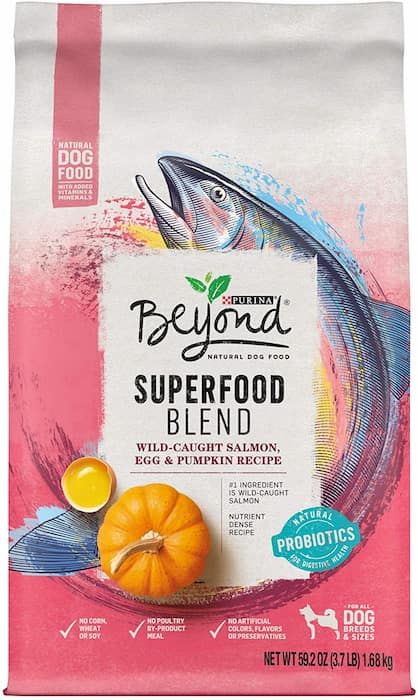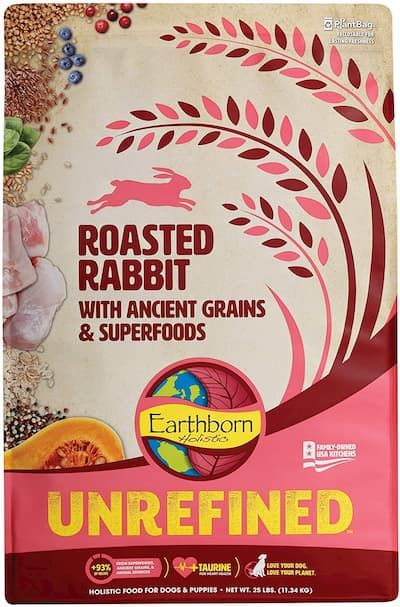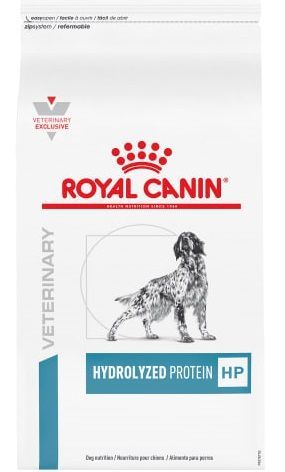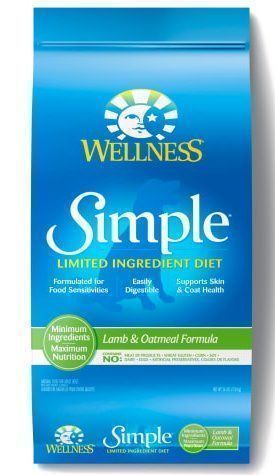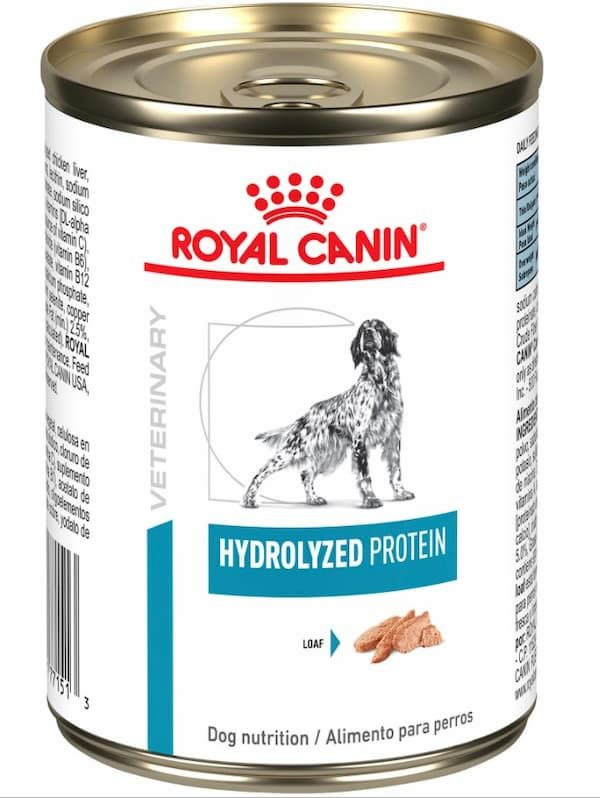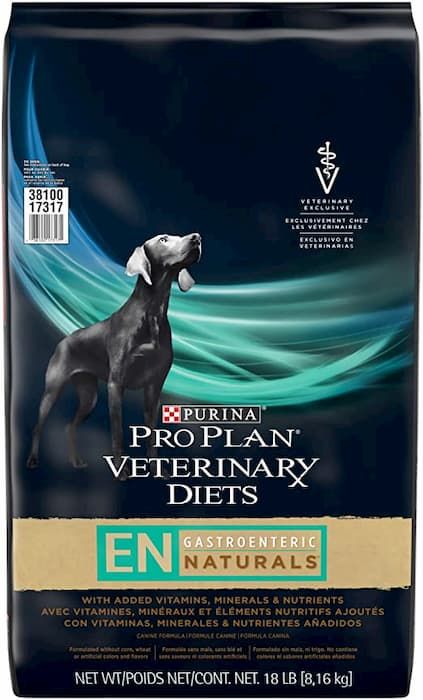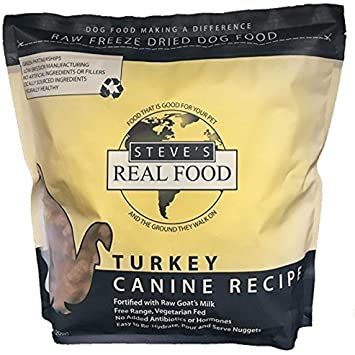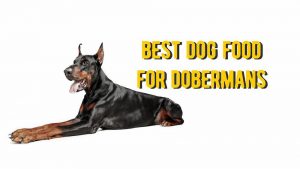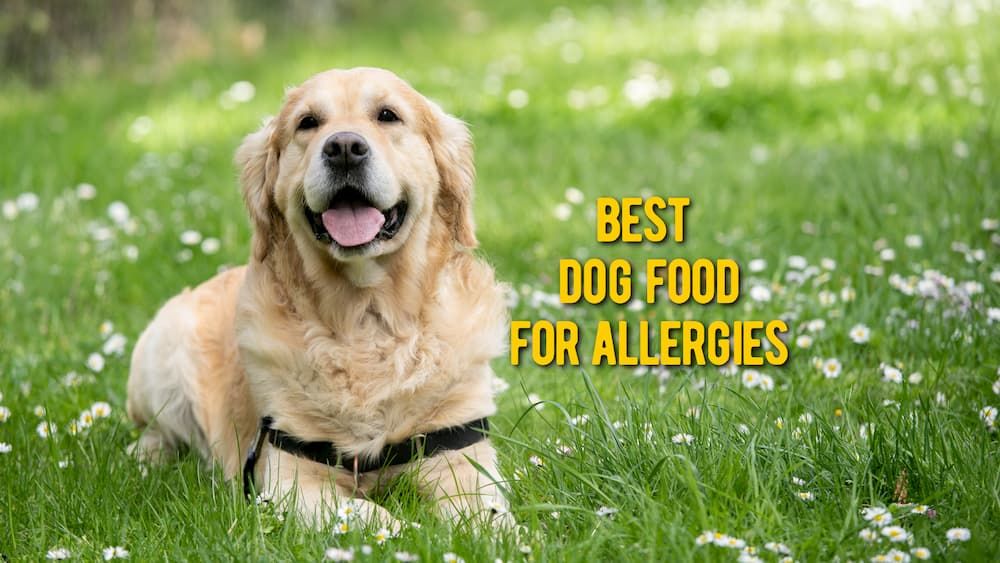
If your pet has developed an allergy, or you have discovered some type of digestive trouble with your dog, finding food that will work for their day-to-day diet can be troublesome. Working to find the most suitable products with allergies can require extensive research and help from your vet. You may have to try several foods in the process. By narrowing down the type of allergy or symptoms your pet is experiencing, and starting your pet on the ideal option to start with, you may have greater success in finding a new food that can help with their allergy.
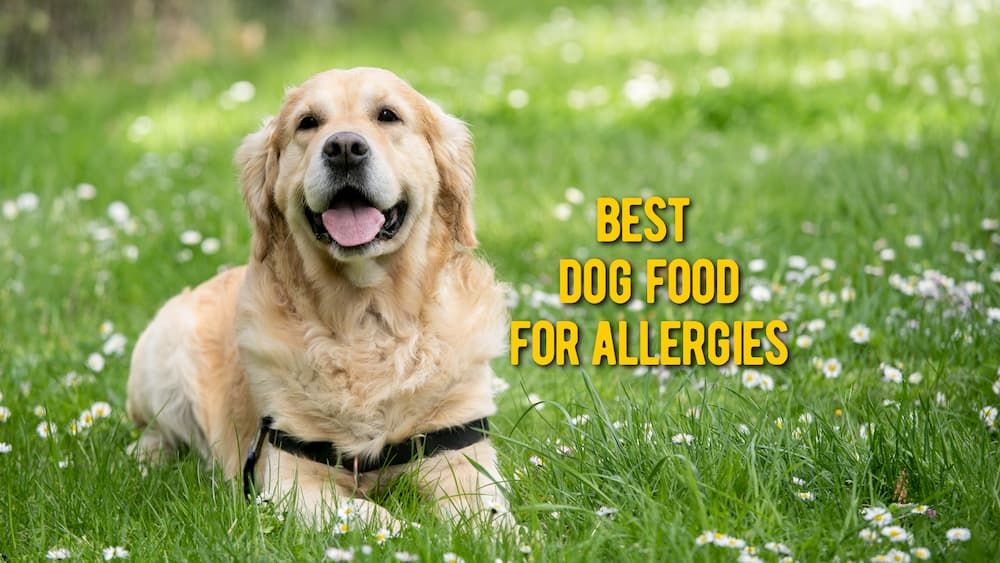

Our TOP-3 Picks of Foods for Dogs with Allergies
|
Product |
Benefits |
Links |
|
Our TOP Pick 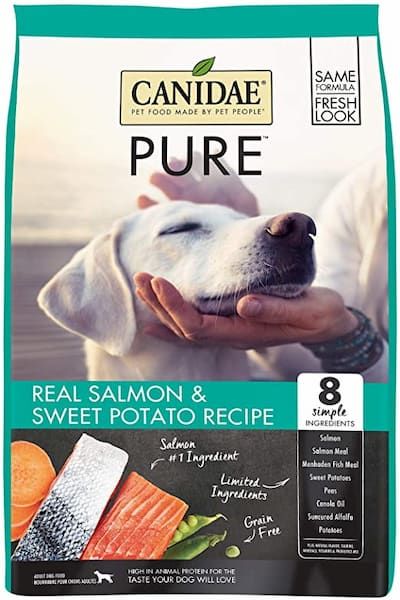
|
1. Canidae Grain Formula Fresh Salmon The product contains no fillers and is built with natural vitamins and minerals through a highly balanced set of ingredients. |
|
|
Grain-Free Pick 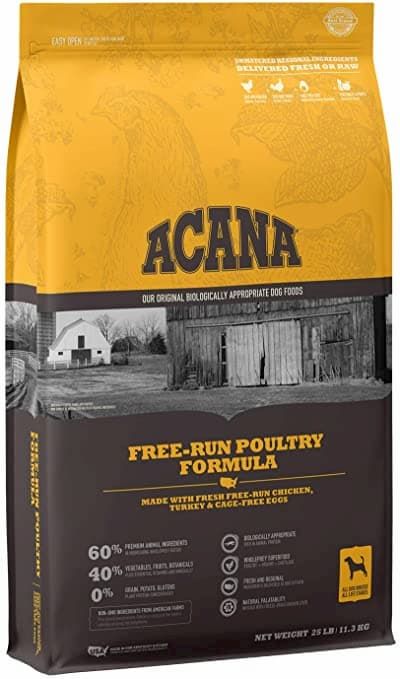
|
2. Acana Grain Free Adult Dog Food, High Protein The beyond natural formula includes some of the best in ingredients and highly balanced formula for dogs of all ages. |
|
|
Our Choice for Limited Ingredient Diet 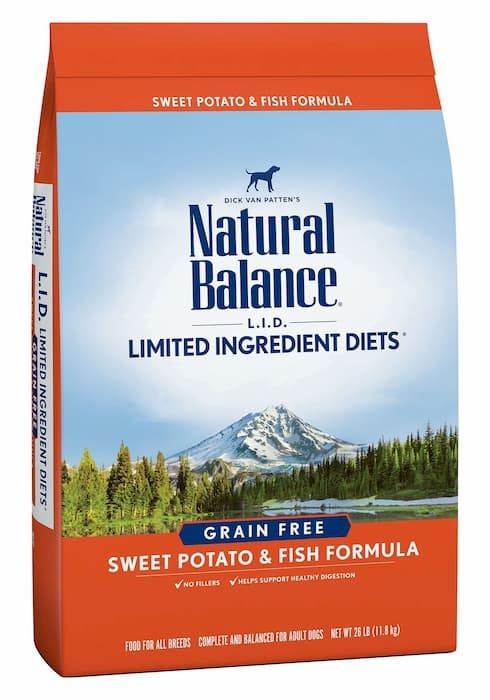
|
3. Natural Balance Limited Ingredients This product with no artificial colors or flavors made for all breeds. |
The Best Hypoallergenic Dog Food
Here are the top hypoallergenic dog foods on the market and the types of allergies that can minimize the symptoms in canines.
1. Canidae Grain Formula Fresh Salmon
This limited ingredient option is designed to assist pets that have sensitive stomachs. Using a series of whole recipes and made in a Texas facility, this is a product that is rich in omega-three and six fatty acids and designed to support healthy skin and a better coat. This is a wheat, corn, and soy-free formula that uses real meat as its first ingredients. No by-products can be found in this mixture, and it comes highly recommended by pet owners seeking pure, meat-first formulas.
Key features:
- 10 or fewer ingredients.
- Designed for pups with fussy stomachs.
- Probiotics included.
- Many flavors.
Pros
Cons
- Uses meat first.
- Includes probiotics.
- Vitamin enriched.
- Can dry out in bulk quantities.
When it comes to a food for food allergies the fewer the ingredients that best. This product has less than 10 ingredients. This food also contains fish as its main protein since many dogs are allergic to beef and chicken.
DVM Sara Ochoa
2. Acana Grain Free Adult Dog Food, High Protein
Acana produces a protein-rich and real meat product which is completely grain-free. The formula that they produce is highly regulated and designed in their kitchens with only the finest ingredients. The fresh regional ingredients that are used in the mixture here are wheat-free and designed to put proteins first. The free-run poultry that is used in the product can make sure that any pets who experience a grain allergy can enjoy better improvements for nourishing food without skin conditions and digestive trouble.
Key features:
- Protein-Rich formula.
- All sized breeds.
- All stages of life.
- Gluten, potato and tapioca free.
- 60% raw fresh ingredients.
Pros
Cons
- Highly regulated production.
- No gluten, potato or tapioca.
- Fresh and 100% raw.
- Protein Rich.
- With the grain free formula, more of the animal by-products are used to bind food.
3. Natural Balance Limited Ingredients
Natural Balance has produced food that is designed with limited ingredients. The sweet potatoes and fish formula is a simple dry food that comes without grains and a natural fiber that can promote a healthy digestion level.
Key features:
- Grain-Free.
- Natural Fiber.
Pros
Cons
- No fillers.
- Grain-free and grain inclusive options available.
- Products for dogs at different stages of life.
- Bones can sometimes be found in the formula.
4. Purina Beyond Natural Superfood Pumpkin
It delivers a hearty punch of caloric-rich alternatives to traditional proteins. Rather than using primarily chicken or turkey, this is a salmon-rich formula containing natural superfood and pumpkin additives.
Key features:
- Uses Real Salmon as the top ingredient.
- A balanced meal without wheat, soy or corn.
- Contains nutrient-dense food. Uses real salmon as the top ingredient.
Pros
Cons
- Does not contain wheat corn or soy.
- Calorie dense ingredients.
- Not ideal for chicken allergies as there are trace amounts of chicken protein.
5. Earthborn Unrefined Roasted Rabbit and Ancient Grains
The Roasted Rabbit Superfood Blend with uses a variety of enhanced ingredients to deliver the best alternatives to traditional proteins. If you had difficulty feeding your pet chicken or other types of traditional proteins in the past, switching to this product could give you a welcome relief from various irritations.
Key features:
- No lintels, chicken, potatoes or fillers.
- 6 ancient grains.
- Produced using hormone free and cage free rabbits. Enhanced with 14 superfoods.
Pros
Cons
- Includes excellent ingredients from superfoods to ancient grains.
- Uses rabbit protein as an alternative to traditional proteins.
- Great for pets that have had allergic reactions to other dry foods.
- Can be expensive.
- Can lead to overactive digestion with the added fiber.
Rabbit is an excellent source of protein for a dog with food allergies. This would be a great diet to try for your dog, who has food allergies.
DVM Sara Ochoa
6. Royal Canin HP Hypoallergenic Hydrolyzed Protein
Using a pet food containing hypoallergenic hydrolyzed protein produced with soy can be the easiest way to combat major irritations like ear problems. The ingredients are hypoallergenic and rice is used as a starch source to keep this product easy to digest.
Key features:
- Soy Protein.
- Omega fatty acids.
- Uses rice as starch sources.
- Can give your pet a well-balanced diet while also ditching traditional fillers and proteins commonly found in pet food.
Pros
Cons
- Made with soy and designed to help with digestion.
- Chelated minerals can be easily absorbed for energy.
- Ingredients to promote gut health and reduce problems with the ears and more.
- The soy protein often makes this an expensive choice.
Even though, this may be a very expensive choice this food works great to help dog who has severe food allergies. These hydrolyzed proteins are already broken down into smaller molecules that are easier for your dog to absorb and will not cause allergy problems.
DVM Sara Ochoa
7. Wellness Simple Limited Ingredient Diet
Wellness Simple produces an all-natural option that also has limited ingredients. This product aims to offer a safer product for digestion and something for pets that tend to overeat. The Limited ingredients and highly dense configuration ensure that this is an option that can keep pets well-fed and digesting well over time.
Key features:
- Made with lamb and oatmeal.
- Designed for whole body health.
- Made in USA.
- It is a great option for pets with sensitive stomachs. Prebiotics and probiotics support.
Pros
Cons
- Contains prebiotics and omega fatty acids.
- Non-GMO.
- Improves coat and sensitive skin conditions.
- Can dry out quickly in large bags.
8. Royal Canin Hypoallergenic Hydrolyzed Protein Can
Royal Canin produces hypoallergenic canned food as well. Using soy proteins, the company also produces a highly digestible product produced with a complex of antioxidants. The minerals included in the mixture also improved the metabolic utilization of trace elements and digestion.
This product stands as one of the greatest options if your pet is highly allergic to grains or if they’ve had difficulty digesting dry food in the past.
Key features:
- Grain Free.
- HA soy protein.
- Coconut oil.
- Chicken flavor.
Pros
Cons
- Made with soy protein and hypoallergenic ingredients.
- Contains antioxidants.
- Includes Chelated Minerals.
- Soy protein in this form can be very expensive.
9. Purina Pro Plan Veterinary Diets EN Gastroenteric Naturals
Purina Pro Plan is a type of dry food that is designed for a veterinary diet. The goal of this formula is to assist with gastrointestinal health and improve digestion. Most of the ingredients used in this product are entirely natural and the dry food is enhanced with mineral supplements to maximize health.
Key features:
- Designed for optimal nutrition.
- Chicken is one of the top ingredients.
- Designed with natural ingredients to promote gastrointestinal health.
Pros
Cons
- Recommended by veterinarians.
- Produced with natural ingredients.
- Includes many vitamin supplements.
- Can use lower quality meat.
10. Steve’s Real Food Freeze-Dried Raw Nuggets
If you have an extremely sensitive dog to grains, choosing a heavy protein diet in the form of raw food can give you access to the greatest option to keep your pet healthy. This product can be easy to rehydrate and offer as a topper for dry food or as a main dish.
Produced using hormone-free and antibiotic-free meat sources and they are designed for easy meals for pet owners that want to feed using raw ingredients.
Key features:
- A freeze-dried turkey meal.
- Available in 6 flavors.
- Fortified with goat’s milk.
- Easy to rehydrate.
- Free-range and vegetarian-fed meats that are hormone and antibiotic-free.
Pros
Cons
- Only high quality meats served in the nuggets.
- Perfect for pets with grain sensitivity.
- Antibiotic and hormone free.
- Can get quite expensive as a pure protein diet can be less filling for pets.
- Requires more effort at meal time.
Final Thoughts
We would highly recommend using the Canidae Pure Real Salmon hypoallergenic dog food if your pet is experiencing trouble with allergies. This is a food that comes extremely highly rated and with hypoallergenic ingredients. As a dry dog food with 10 key ingredients or less, these are simple products that are produced in the USA with quality ingredients. Making the switch to this high-quality option can often lead to massive improvements with allergies in your pets.


Buyer’s Guide
Does your dog have allergies? There are multiple reasons that your pet may have these signs. Food allergies are a very common thing that is seen in dogs. If you think that your dog’s food is causing these allergies, it would be best to see your vet. They can examine your family friend and let you know if the signs that you are seeing are because of food allergies or something else.
Symptoms of Food Allergies in Dogs
Most of the signs of food allergies in dogs are seen as an allergic reaction with sensitive skin. You may also notice GI signs such as diarrhea and gas. With a dog who is allergic to their food, there are many signs that you may see. These are some common symptoms of a dog who has this type of allergy.
Skin Rashes
The most typical physical sign that you will see if your dog has a food allergy is a rash on their skin. A skin reaction is when it becomes red and irritated and sometimes forms a mild rash. If your pet has a skin rash, this does not mean that they, for sure, have food allergies. This could also mean it was something they touched or even inhaled that is causing this reaction. The most common place to see a skin rash is around the rectum.
Hair loss
A more severe skin reaction will cause hair loss. Often hair loss can be associated with a low-quality product, but it can be a sign of much more severe disease as well. Any time hair loss is observed, it is recommended to have your pet examined by a veterinarian, as some diseases can become life-threatening.
Ear Infection
Many allergies cause your dog ears to become inflamed and itch. When your pet itches their ears, they are damaging the surface of the sensitive skin. This sets up the perfect place to develop an ear infection.
Many times, these ear infections can be very painful. Even though you may have switched their diet to a diet for food allergies, you may still need to see your vet to get medication to treat the ear infection.
Diarrhea
If your dog has this allergy, they may also have diarrhea.
The lining of their intestines becomes inflamed due to the allergen. This will cause the GI tract to move more, leading to diarrhea. Many times, this can easily be correct with a diet change and probiotics. Most dogs with diarrhea due to food allergies will still be very happy dog but will have a little abdominal discomfort.
Gas
Foods can cause a dog to have gas. This is due to the extra bacteria that form in the GI system with the intestines become inflamed. These dogs will have gas all the time and can even cause a whole room to stink so much that you have to leave.
Other Causes of Food Allergies
Just like with humans, your pet may develop a runny nose and sneeze frequently. Watery eyes and sometimes itchy or infected ears may occur.
Dog Breed Most Prone to Food Allergies
While almost any dog can have food allergies, there are some breeds that seem to be more prone to these allergies.
These breeds are:
- Labrador Retrievers
- Dachshunds
- German Shepherds
- Cocker Spaniels
- Bulldogs
- Golden Retrievers
- Pugs
- Pit Bulls
- West Highland White Terriers (Westies)
- Yorkies
READ MORE: Best dog DNA tests


11 Common Dietary Allergens Seen in Dogs
There are many things that are commonly found in your dog’s food that they could be allergic to. These are some of the most common things that are seen causing these allergies.
Artificial Ingredients
This includes any flavoring, chemical preservatives, or colorings. These often cause many allergy-related problems. Eating these can cause:
- Skin problems like dry, itchy and irritated sensitive skin,
- Poor hair coat like brittle, dry or poor textured coat and hair growth issues,
- Discolored nose,
- Digestion problems such as an upset stomach which will lead to decreased appetite, vomiting, nausea, or abnormal-looking stools
There are even other links between preservatives and dyes and some major health problems, such as neurological issues, organ damage, and cancer.
Food Dyes
Some products are packed with food dyes. These dyes are often put to make the food look more attractive. Food dyes do not have any real nutritional value. They will even on occasion end up making your family friend have an allergic reaction. Dyes are not a natural substance, and often our pets can have a reaction to it. The most common things seen with food dyes is a rash with hives and even hair loss. By correctly transitioning your pet to food that does not contain any dyes, you may correct the allergy problem.
Fillers
Some brands have fillers in their food. Fillers are a cheap ingredient that is used to bulk up the food. They contain very little to no nutrients. When your pet eats these ingredients, they will feel full, but this will only last for a short period of time. Some of the top fillers seen in foods are corn, hulls, husks, seeds, and pulp. These are some of the common things that dogs are allergic to.
Meat by-products
Meat By-product refers to the part of the animal that is deemed unfit for people to eat. This includes all these parts of the animal – beaks, brains, lungs, spleens, claws, toes, intestines, and undeveloped eggs. This can be almost anything that is not used for human food. These parts are then ground up and put into your dog’s food and called by-products.
Beef
Beef is a very common cause of allergies. If you are feeding your pet the same food for years, they can develop an intolerance or allergy to something. Beef is one of the most common ingredients. This is the reason it is the most common food allergen seen in a dog.
Rotating the diets that you feed your dog will help them from developing an intolerance to an ingredient found in that food.
Dairy
Most dogs have problems digesting lactose. This is actually an intolerance and not an actual food allergy. Lactose intolerance just like in people with causes gas, diarrhea, and vomiting. What is tricky is that a true dairy allergy can also cause these symptoms. It is very hard to know if your dog is suffering from an actual food allergy or an intolerance. One of the best ways to tell the difference is a dairy allergy will be seen as skin itchiness, where lactose intolerance is always digestion-related.
Wheat
There are many different views regarding foods that have carbohydrates, especially when it comes to grains. It is more common for a pet to have allergies to meat than grains. Some dogs, however, will have an allergic reaction to wheat.
Eggs
If your dog has an egg allergy, this means that a system overreacts to the proteins that are in the egg yolk. Eggs are usually very easy to avoid in your pet diet.
Chicken
This is one of the most common proteins that dogs are allergic too.
Lamb
Most commercial products are made with chicken or beef. Lamb is usually considered a great option for dogs that have food allergies when they eat regular food.
Lamb, however, can also be a source. If you think that your pet is having this allergy and is eating lamb, try venison or rabbit.
Soy
Some studies showed that if your dog eats soy, it can cause many health issues beyond just allergies. It can affect reproductive and growth problems, thyroid, and liver disease.
READ MORE: Do neutered dogs live longer?
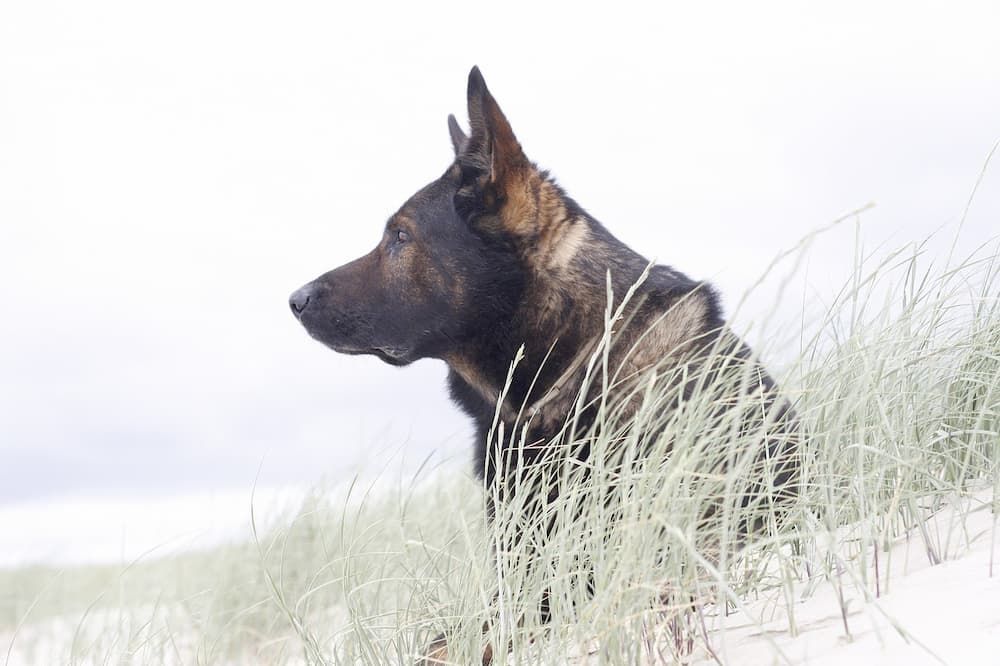

How to Choose the Right Product
When looking to get the right hypoallergenic dog food for your dog, look at the back of the bag. This will list the ingredients. For an adult dog, you would want to look for a product that contains a good source of protein, carb, and fats.
- Protein: Proteins are one of the essential ingredients that you need for your dog. A great source of proteins that you could feed your dog is lamb, chicken, fish, beef, or turkey. The muscles of an animal contain the protein for your dog. It is great to feed your dog an unprocessed protein source. Many of the processing methods can destroy the proteins.
- Carbohydrates: All dogs need carbohydrates in their diets. These are some of the most important ingredients. When it comes to your dog, you must be very careful because there are many different carbohydrates types. Some dog’s stomachs will have a very hard time processing some of the most common carbs, such as soy and corn. These are usually found in many of the cheaper products. When looking for dog food, try to find a formula with carbs that are easier to digest, such as brown rice or sweet potato.
- Fats: Every dog will need to eat some good fats. These fats will help your pet have a very nice, shiny, and healthy coat. When looking at food, fish oils are one of ingredients for a healthy coat.
RELATED ARTICLE: Dog seasonal allergies
Final Thoughts
If your dog is reacting to the food, it is eating, and it is best to switch diets to something that their body can tolerate. There are many great choices that you can pick from that will help
FAQ
How is Dog food for allergies different from regular food?
Dog for food allergies has different protein sources that most dogs are not allergic to. These include fish, venison, rabbit, buffalo, duck, and many others.
Some dog is highly allergic to almost all dog food, and some companies have developed a limited ingredient diet where their food only contains just a few different ingredients. Also, some companies have developed a hydrolyzed protein diet.
This is where the proteins have been broken down, making it easier for your dog to absorb the nutrients without causing any irritation to their GI system.
How to test my Dog for food allergies?
A blood test can be done for food allergies; these are not the most accurate test and can be quite expensive. If you do think that your pet has this allergy, sometimes totally switching their diet to something different will stop all of their problems.
These foods trial should last for at least six weeks before you decide that the product is good to feed your dog or not.
How can I help my Dog with Allergies?
If you think that your dog has a food allergy, the best thing to do is take them to your vet. They can discuss all the different options for your pet and help get them started on the proper treatment.
You can also start a food trial at home. When at the pet store, look for a specific diet or one that has a different protein source than your pet is currently eating.
Can probiotics help my Dog?
Probiotics are great for dog’s with allergies. These can help rebalance the natural bacteria that live in the digestive system. A dog with food allergies will often have a disturbance of these bacteria, causing gastrointestinal signs such as vomiting and diarrhea.

